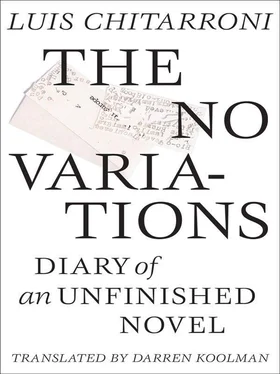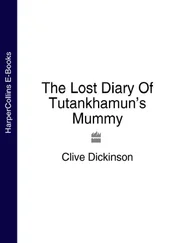We toasted again. She and I were drinking gin and vodka, respectively, and practically straight up — on a single rock each. We said all there was to be said in all those languages in which nothing need be said … But the clink of our glasses added little to these interjections. We might as well have been hoisting a couple of milk jugs in broad daylight.
“Our sins, Mr. Rico, are only of concern [and only start to matter to us] once we’ve stopped sinning. Then we reap our so-called reward. The preacher who married my mother made that quite clear. And so I’m always vigilant, always alert. I ended up going to Brazil with Mr. Quint, Basil Quint, Hugo’s cousin — a businessman, among whose many deals during that time I’m afraid I would have to be counted [as] the least significant. Basil always went on his business trips weighted down by new theories regarding this and that: I used to call them his “carry-on baggage.” For instance, he used to say the highest aspiration of any decent and honest citizen is to be a tourist, and also …”
Ignorance, license, laziness: who among them could so much as recognize it, who among them could take the hint? Not a single one of them: the gentleman of the jury! They knew all about what everyone was reading without ever bothering to read (let alone memorize) a single poem, a single line. The possibility that ordinary, quotidian language might ever be found in a poem didn’t amuse them in the least — or even make much of an impression. The gulf separating us wasn’t just a matter of passive consecration and active anonymity; it was in the view that the act of reading is an exercise in forgetting (the nuisance, the burden) all that doesn’t pertain to oneself. And the things that pertain to them are prizes, tributes, reviews — more incentives not to read. And they wouldn’t — they wouldn’t read my book; they’d read me , or rather my pseudonym : Atrius Umber. And boy, he’s sure racked up the points for me while I wait here in the dark; enough for them to hand me the prize. Moreover, I seem to remember having presciently, preemptively, commended the four of them — in reviews, in post-award speeches — with all the astuteness and patience of someone who foresees — is investing in — receiving a favor in return, someday. The conspiracy of gratitude would unfold in the Silvio Astier Amphitheater.
In this sense, Accents , Répide Stupía’s book, was nothing more than the flimsiest pretext, but the best one possible, under the circumstances. Irreproachable on formal grounds, it had the virtue of going unnoticed initially due to the author’s misanthropy. But, likewise, thanks to his misanthropy and his wilful anachronisms, his work ended up becoming wholly acceptable, plausible, to contemporary tastes. And if he could be plausible, then I, who am not, could begin at last to be a Somebody, thanks to [as a consequence of] the simple, relaxing occupation of plagiarizing him.
“Early”
“He’s asking for a play.”
“A play by whom?”
“He said (let me see, I wrote it down) by Ann Jellicoe.”
“In that case, suggest Mr. Logic & Miss Understanding .”
(Lord Swindon)
“The gentleman has arrived a day early and would like to wait.”
“Wait for what? I don’t believe time is wont [able] to [oblige] suit [obey] him.”
“The gentleman has decided to stay , I mean.”
“Those are very different things. And ‘I mean’ reduces all meaning to ash. ‘To stay,’ on the other hand, implies location, a specific place, and only tomorrow will we know if such a place exists. For him or any other guest.”
“In any case, the gentleman told me he’s waiting for your decision.”
“I can’t make the decision until after the [his] arrival.”
“But he’s already here.”
“A situation we sadly share.”
“And he wants to stay.”
“That [this] is where the similarity ends.”
“What do you want me to do?”
“Depends on what you want to do.”
“I mean, with him .”
“That depends in large measure on what he wants to do with you .”
“Sir, we owe him a response.”
“How can I owe something to someone who shouldn’t even be here?”
“He deserves it, poor guy.”
“But, you see, to visit upon a victim his just desserts is an exercise of power I’d rather [I prefer to] avoid.”
“If he leaves, something terrible might happen.”
“I fear it’s already happened. Simply on account of his being here.”
“You have no respect.”
“On the contrary: [It’s] you [who] have too much respect.”
“He has come with a proposition.”
“And he can leave with it.”
“He was invited.”
“To arrive before being invited is a form of discourtesy that demands immediate reciprocation. One of the few for which such reciprocity is demanded, in fact. So get rid of him.”
“We’re not about to hand out the same information you could very well research yourself in any museum. And look, if you want them to understand what you’re after, make sure to call her, ‘ Frah Ann Jellicoe.’”
Biography of Lord Swindon
Ingenuity of lists
How do we appropriate?
Original Soundtrack
In “Early,” listening to whatever (whatever, that is, Charles imposes on everyone). Contrast this with what the narrator listens to:
— The narrator, when alone: Incredible String Band, Joy Division, the Teardrop Explodes …
… XTC, Cockney Rebel, Duncan Browne — the Blue Aeroplanes?
Too late, in their roughest patches, they managed to sound like the Stranglers.
— Gilbert & George:
Noel Coward: “Poor Little Rich Girl,” “A Room with a View.”
Lenny Bruce, Tom Lehrer, Brute Force.
— The kid from the car: Django Reinhardt, Wes Montgomery, George Benson. He plays the guitar. “Caresses it,” according to Gilbert (or George).
Cole Porter
When Marina’s talking on the telephone, Penguin Café Orchestra:
“The Sound of Someone You Love Who’s Going Away and it Doesn’t Matter”
Rovira
Piazzolla: “Ode to a Hippie.”
Luis Alberto del Paraná. Those who listened to him in London, those he listened to.
Keyboards: Alan Price (Animals), Brian Auger (J. Driscoll, The Trinity), Stevie Winwood (Spencer Davis Group, Traffic, Blind Faith), Garth Hudson (The Band), Mark Stein (Vanilla Fudge), Doug Ingle (Iron Butterfly)
The music we adopted to impress girls. The cube root of error.
It’s pointless, him rehearsing
What to say in her memory ,
when Koechlin’s answer
Étude sur les notes de passage
still rests on the music stand .
Ironic too , anche
what the muse will say
in flight from everyone , en fin
( There was a crueller month than April ).
In homage to what he heard, he listens .
Around the deserted isle, autumn fluxes ,
he listens to what was (it’s supposed to be music ,
it is noise
But not for me).
In “The Scent of Thunbergias,” Misia Taboda. Lady Obstreperous . Bette Davis. Mankiewicz’s All About Eve . W. S. Maugham’s The Letter . Dotty Dabble. Mme Marasm. Mme Sarcasm.
There’s no better place for hiding a secret than an unfinished novel (Calvino, Italo). Quoted by someone else, citation needed.
Voices: George Sanders, Tom Conway.
Finally decided on a title: The X-Positions ( Las equis distantes )
And, incidentally: no one else seems to like it.
(Appendices)
Читать дальше












